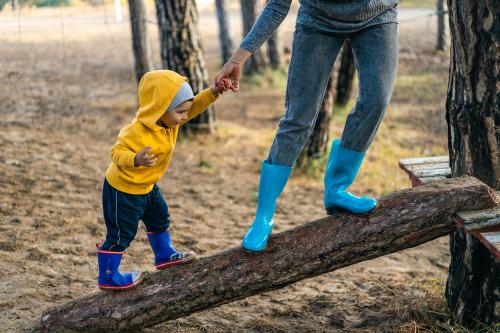Early Childhood Transitions
Welcome to the New Hampshire preschool special education webpage for Early Childhood Transitions. Children experience many transitions between birth and five years old. This page is focused on the transition from Family Centered Early Supports and Services (FCESS) to Part B 619, preschool special education as well as the transition from preschool special education to Kindergarten.
Transition from FCESS to Preschool Special Education
The transition from Family Centered Early Supports and Services (FCESS) to preschool special education and other community services is a time for change. Change may cause stress. We can reduce this stress and make the transition a positive experience for all involved by working as a team with families, school district personnel, early supports and services, and all other early care and education staff working with the family.
Transition from Family Centered Early Supports and Services - A Guide for Staff and Families (Spring 2011)
The purpose of this guide is to help families and professionals understand their roles and responsibilities in the transition process. It also includes a Transition Dictionary to clarify the language used during the transition process and to encourage clear communication among team members.
FCESS Guidebook Insert
This document provides an overview of terms regarding transitions and the overall transition process.
Who's Doing What In Early Childhood Transitions On-line Module
This online module includes the major activities of the transition process and was updated in 2017 to reflect changes to the NH Standards to the Education of Children with Disabilities. Interactive components such as videos from the family and professional perspectives and journaling are included as training tools. This module was created by Race2K, a project funded by NHED to provide information, support, and technical assistance to districts on improving outcomes for preschool children with disabilities and their families.
Indicator 12 IDEA Part B Data Fact Sheet
Indicator 12 measures the percent of children referred by Part C prior to age 3, who are found eligible for Part B, and who have an IEP developed by their third birthday. This data is captured in the New Hampshire Special Education Information System (NHSEIS) by flagging children’s information imported from the IDEA Part C Family Centered Early Supports and Services (FCESS) and as entered by the district through the student’s date of birth, eligibility determination and determination date, the IEP signature and implementation date on the third birthday. This data is reported using the Early Childhood Transitions Report in NHSEIS and through the Bureau’s Indicator 12 desk audit. This resource provides guidance on Indicator 12 and the reporting processes.
Eligibility Differences between Part C and Part B, 619
The Early Childhood Technical Assistance (ECTA) Center has information on the differences between Part C and Part B, 619.
Transition from Part C to Preschool | ECTA Center
The Early Childhood Technical Assistance (ECTA) Center has resources for leading the transition process and a checklist that can be used to guide a review of existing documentation during the transition process.
Transition from Preschool Special Education to Kindergarten
The IEP team should support children and families in the transition to Kindergarten. This includes collaborating with family members and Kindergarten staff to promote positive relationships and adjustment to new settings.
Kindergarten Readiness and Transition
NHED has pulled together a variety of resources for families and school personnel related to Kindergarten transition, including a definition for Kindergarten readiness and recommended transition practices.
Related Content
Supporting children with disabilities: a guide to understanding early childhood special education programs
Partnering with community preschool programs
Eligibility and service delivery policies: differences between IDEA Part C and IDEA Part B




